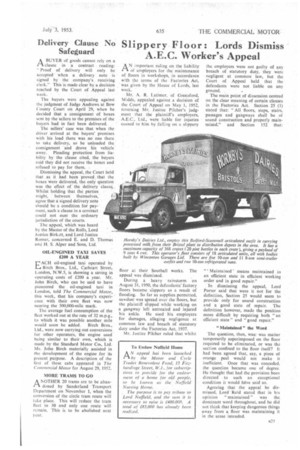Slippery Floor : Lords Dismiss A.E.C. Worker's Appeal
Page 55

If you've noticed an error in this article please click here to report it so we can fix it.
A'important ruling on the liability of employers for the Maintenance of floors in workshops, in 'accordance with the terms of the Factories Act, was given by the House of Lords, last week.
Mr. A. R. Latimer, of Greenford,
iddx, appealed against a decision of the Court of Appeal on May 1, 1952, reversing Mr. Justice Pilcher's judgment that the plaintiff's employers, A.E.C., Ltd.., were liable for injuries caused to him by ,falling on a slippery
floor at their Southall works, The appeal was dismissed.
During a heavy rainstorm on August 31, 1950, the defendants' factory floors became slippery as a result of flooding. So far as supplies permitted, sawdust was spread over the floors, but the plaintiff slipped while working on a gangway left untreated and injured his ankle. He sued his employers for damages, alleging negligence at common law and breach of statutory duty under the Factories Act, 1937.
Mr. Justice Pilcher ruled that whilst the, employers were not guilty of any breach of statutory duty, they were negligent at common law, but the Court of Appeal held that the defendants were not liable on any ground. • The main point of dissension centred on the clear meaning of certain clauses in the Factories Act. Section 25 (1) stated that: " All floors, steps, stairs, passages and gangways shall be of sound construction and properly maintained," and Section 152 that: " ' Maintained' means maintained in an efficient state in efficient working order and in good repair."
In dismissing the appeal, Lord Porter said that were it not for the definition, Section 25 would seem to provide only for sound construction and a good state of repair. The definition however, made the position more difficult by requiring both "an efficient state" and "good repair."
" Maintained " the Word
The question, then, was: was matter temporarily superimposed on the floor required to be eliminated, or was the section confined to the floor itself? It had been agreed that, say, a piece of orange peel would not make it inefficient. Once that was conceded, the question became one of degree. He thought that had the provision been directed to such an exceptional condition it would have said so.
Agreeing that the appeal be dismissed, Lord-Reid stated that in his
opinion " maintained " was the dominant word throughout, and he did not think that keeping dangerous things away from' a floor was maintaining it in the sense intended.




























































































































































